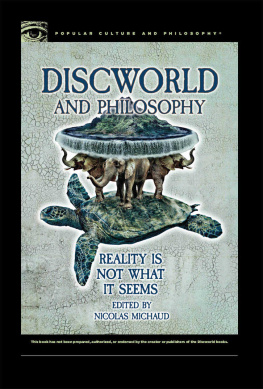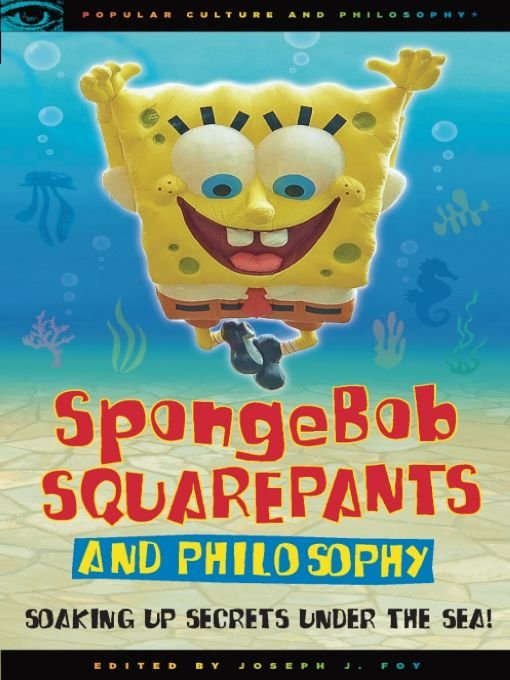Table of Contents
Popular Culture and Philosophy Series Editor: George A. Reisch
VOLUME 1
Seinfeld and Philosophy: A Book about Everything and Nothing (2000)
VOLUME 2
The Simpsons and Philosophy: The Doh! of Homer (2001)
VOLUME 4
Buffy the Vampire Slayer and Philosophy: Fear and Trembling in Sunnydale (2003)
VOLUME 5
The Lord of the Rings and Philosophy: One Book to Rule Them All (2003)
VOLUME 9
Harry Potter and Philosophy:
If Aristotle Ran Hogwarts (2004)
VOLUME 12
Star Wars and Philosophy: More Powerful than You Can Possibly Imagine (2005)
VOLUME 13
Superheroes and Philosophy: Truth, Justice, and the Socratic Way (2005)
VOLUME 19
Monty Python and Philosophy: Nudge Nudge, Think Think! (2006)
VOLUME 25
The Beatles and Philosophy: Nothing You Can Think that Cant Be Thunk (2006)
VOLUME 33
Battlestar Galactica and Philosophy: Mission Accomplished or Mission Frakked Up? (2008) Edited by Josef Steiff and Tristan D. Tamplin
VOLUME 35
Star Trek and Philosophy: The Wrath of Kant (2008) Edited by Jason T. Eberl and Kevin S. Decker
VOLUME 36
The Legend of Zelda and Philosophy:
I Link Therefore I Am (2008) Edited by Luke Cuddy
VOLUME 37
The Wizard of Oz and Philosophy: Wicked Wisdom of the West (2008) Edited by Randall E. Auxier and Phillip S. Seng
VOLUME 39
Jimmy Buffett and Philosophy: The Porpoise Driven Life (2009) Edited by Erin McKenna and Scott L. Pratt
VOLUME 40
Transformers and Philosophy (2009) Edited by John Shook and Liz Stillwaggon Swan
VOLUME 45
World of Warcraft and Philosophy: Wrath of the Philosopher King (2009) Edited by Luke Cuddy and John Nordlinger
Volume 46
Mr. Monk and Philosophy: The Curious Case of the Defective Detective (2010) Edited by D.E. Wittkower
VOLUME 51
Soccer and Philosophy: Beautiful Thoughts on the Beautiful Game (2010) Edited by Ted Richards
VOLUME 53
Martial Arts and Philosophy: Beating and Nothingness (2010) Edited by Graham Priest and Damon Young
VOLUME 55
Doctor Who and Philosophy: Bigger on the Inside (2010) Edited by Courtland Lewis and Paula Smithka
VOLUME 56
Dune and Philosophy: Weirding Way of the Mentat (2011) Edited by Jeffery Nicholas
VOLUME 58
Dexter and Philosophy: Mind over Spatter (2011) Edited by Richard Greene, George A. Reisch, and Rachel Robison-Greene
VOLUME 59
Halo and Philosophy: Intellect Evolved (2011) Edited by Luke Cuddy
VOLUME 60
SpongeBob SquarePants and Philosophy: Soaking Up Secrets Under the Sea! (2011) Edited by Joseph M. Foy.
IN PREPARATION:
Sherlock Holmes and Philosophy (2011) Edited by Josef Steiff
Philip K. Dick and Philosophy (2011) Edited by D.E. Wittkower
Inception and Philosophy (2011) Edited by Thorsten Botz-Bornstein
The Rolling Stones and Philosophy (2012) Edited by Luke Dick and George A. Reisch
For full details of all Popular Culture and Philosophybooks, visit www.opencourtbooks.com.
To Connor Joseph,
May you always greet the world with a smile,
a song, and the feeling that you are ready.
Love, Daddy
You must learn to be a sponge, if you want to be loved by hearts that overflow.
Friedrich Nietzsche,
Thus Spoke Zarathustra
SPONGEBOB: Quick, Patrick, without thinking! If you could have anything right now, what would it be?
PATRICK: Um... More time for thinking.
Chocolate with Nuts, 2002
Acknowledgments
I want to begin by thanking the contributors to this volume. Your enthusiasm for the project made working on this book a true delight, and I appreciate your efforts and many superb insights into this beloved show. I would also like to express my thanks and gratitude to George Reisch and the good people at Open Court for embracing this volume, as well as for their patience and guidance along the way. Thank you to my friends at the University of Wisconsin-Waukesha and across the University of Wisconsin System. I want to express my gratitude in particular to Dean A. Kowalski, without whom I would likely never have had such wonderful opportunities. Thanks to my parents, Sue and Jim, brother Shawn, and sisters Leah and Keri for always allowing me to be who I am (and loving me all the same). I hope you can share this book with my special nieces and nephew so that they know their Uncle Joe is thinking of them. Finally, no words could even begin to express my sincere appreciation for my wife Kristi and son Connor whose patience and understanding teach me what is truly important in this world.
Who Teaches Philosophy Under the Sea?
In 1999, following the Nickelodeon Kids Choice Awards, the world was greeted by a portrait of a pirate with moving lips asking if we were ready. Ready for what? Little did audiences know that they were about to meet a little yellow sponge who would make history for childrens programming and leave a lasting mark on audiences across the globe.
SpongeBob SquarePants, which recently celebrated its eleventh year on the air, is a proven staple of American and international popular culture. One can hardly walk into a shopping center, bookstore, market, or preschool, elementary school (or in some cases, college) classroom without being greeted by happy images of SpongeBob, and a favorite image of mine to show my classes is graffiti from a wall in Mexico with a crudely spray-painted SpongeBob caricature with the words Bob Esponja Presidente or SpongeBob for President.
Although it debuted in relative obscurity, by its second season SpongeBob SquarePants saw an enormous growth in viewership and ratings. It has continued in its popularity for the past decade. Most notably, nearly nine million viewers tuned in to view the November 12th, 2007, Atlantis SquarePantis, a musical film guest starring the legendary David Bowie. According to sources at Nickelodeon, nearly forty-five million people over the age of eighteen watch SpongeBob every month, and President Barack Obama and the first family, actress Scarlett Johansson, actor Johnny Depp, and basketball icon LeBron James all count themselves among the millions of fans of the show. Likewise, the popularity of the series is matched only by its critical acclaim. At the time of this books production, SpongeBob has taken home over forty major production awards since its debut, including seven Emmy Awards (four straight from 2007 to 2010). Syracuse University Professor Robert Thompsonperhaps the most notable scholar in the field of popular culture studies in the United States todaysays its impossible to overestimate how much SpongeBob has penetrated American culture.
A major part of SpongeBobs appeal is that it draws an audience of all age groups. As Thompson said in a National Public Radio














